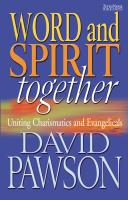David Pawson: Word and Spirit Together
 David Pawson, Word and Spirit Together: Uniting Charismatics and Evangelicals (London, Sydney, Auckland: Hodder and Stoughton, 1998), 159 pages.
David Pawson, Word and Spirit Together: Uniting Charismatics and Evangelicals (London, Sydney, Auckland: Hodder and Stoughton, 1998), 159 pages.
Originally published as The Fourth Wave in 1993, the second edition of this volume features a new title that captures the importance of holding together the mutual emphases of Word and Spirit against the backdrop of what has since also come to be known as the “fourth wave”—the “mixed blessing” of the Toronto revival. The author, a widely recognized theologian in British evangelical and charismatic circles, argues for the importance of dialogue between these two movements, especially given the charismatic emphases on experiencing the gift of the Spirit as well as moving in the spiritual gifts, and the evangelical commitment to the apostolic gospel and to proclaiming it. Part I of this book develops these as characteristic features of both movements, and explores possible reasons why evangelicals have not, generally speaking, embraced the charismatic renewal—given the Reformers’ rejection of the radical Anabaptist movement, the Puritan emphasis on preaching, and the orientation of dispensational theology toward understanding the charismata within a cessationist framework—and how evangelical attitudes toward those in the charismatic movement have progressed from suspicion, toleration, and coalition toward the possibility, finally in our time, of meaningful integration.
Pawson does his theological criticism and synthesis in Part II where he attempts to resolve, in successive chapters, differences in views of theology, prophecy, initiation, tongues, worship and holiness. His method is to explore what evangelicals and charismatics can contribute to each other, and how a critical correlation between emphases on both sides yields a richer overall understanding of the subject under consideration. Theologically, for example, Pawson suggests that evangelicals have much to learn about the dynamic and experiential elements of theology from charismatics, even while the latter need the sola scriptura commitments of the former. Prophecy is not to be equated with Scripture (as evangelicals have long insisted against charismatics), even while the prophetic and apostolic offices and functions of the Church are not to be relegated to the early Christian period nor considered to be abnormal today (as charismatics have responded). On the controversial issue of Christian initiation (to which Pawson has elsewhere devoted an entire volume), evangelicals are right to reject the traditional Pentecostal doctrine of Spirit-baptism as subsequent to salvation; on the other hand, Pawson insists that Pentecostals and charismatics are right to distinguish merely believing in the Spirit from receiving the Spirit in that the latter has discernible effects regarding the believer’s empowerment for ministry. Tongues, Pawson suggests, is neither everything (as charismatics have at times excessively claimed), nor nothing (as evangelicals have sometimes retorted). Worship needs to be both spontaneous, affective, and charismatic and liturgically ordered and cognitive. Finally, Christian life in the Spirit means that the spiritual gifts should not be confused with the fruits of the Spirit, even while those who exhibit the fruits of the Spirit should aspire to be used by God through the charismatic gifts.
This is an important book for Anglo-American evangelicals, Pentecostals and charismatics. One of the questions that it should lead us to ask is whether or not the peculiar forms of these movements in the Western world exhaust the meanings of “evangelical” or “charismatic.” I hazard to guess that they do not. If not, then, this might mean that as evangelicals and charismatics wrestle with what it means to unite Word and Spirit in a global context, we need to be alert to the power of the Word and the surprises of the Spirit to redefine our preconceived ideas both about what God is doing in the world, and about what we should be doing as well.
Reviewed by Amos Yong
Category: Spirit, Summer 2000


